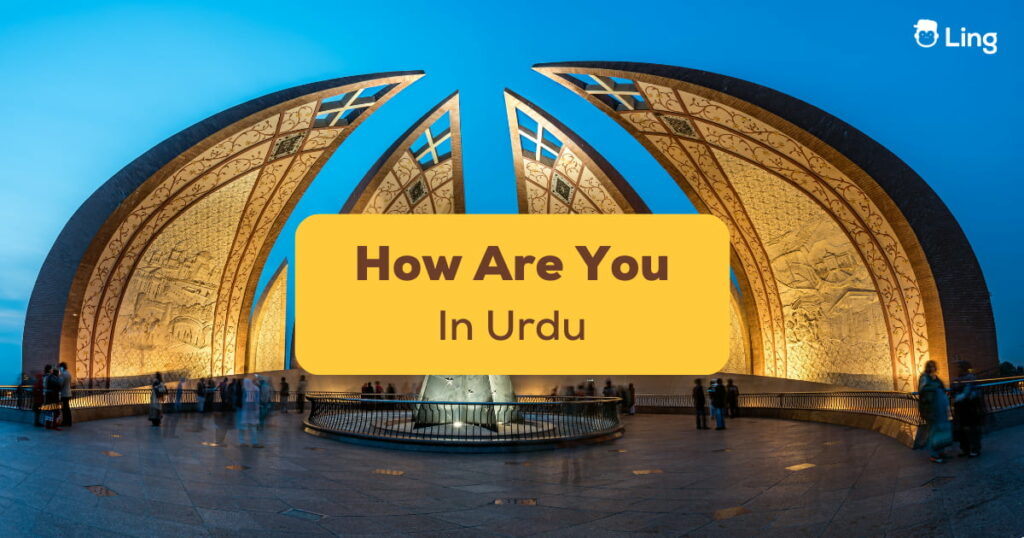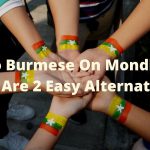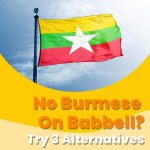Do you wish to integrate well into Pakistani society and connect better? We strongly advise you to use some expressions in the Urdu language to talk with someone. In this article, you will learn some interesting ways to ask, “how are you in Urdu.”
Among Pakistanis, forgetting to inquire about a person’s family demonstrates a lack of sensitivity as well as an opportunistic mindset. So, it’s obvious after greeting your friend, the first thing you will ask him/her is How are you? (آپ کیسے ہیں؟) read as “Aap kaise hain”? You can also say, “tum kaise ho?” (تم کیسے ہو) if the person is known to you. Most probably, you will get the answer as “mei theek hun” (میں ٹھیک ہوں) which means, “I am fine.”
Hence, the Ling app serves as a great app to practice Urdu in front of Pakistani friends. Ling is the most popular online learning platform, with hundreds of foreign languages available. As a result, it makes things as simple as possible for you while also making them enjoyable and memorable.

Basic Ways to Ask How Are You In Urdu
There are numerous ways to ask someone, “How are you?” It’s a good idea to remember which ones require a longer response, so you don’t ask them when you’re pressed for time!
The list below contains the formal ways to ask How Are You in Urdu. You can use it in your everyday Urdu conversation.
| English Phrases | Urdu Phrases | Pronunciation |
|---|---|---|
| How are you doing? | آپ کیسے ہیں؟ | Aap kaise hain? |
| How have you been? | کیا حال چال ہے تمہارا؟ | Kiya haal chaal hai tumhara? |
| How’s everything? | کیا حال ہے؟ | Kiya haal hai? |
| How’s it going? | کیسا چل رہا ہے؟ | Kaisa chal raha hai? |
| Everything okay? | سب کچھ ٹھیک ہے؟ | Sabkuch theek hai? |
| What’s going on? | کیا ہو رہا ہے؟ | Kiya horaha hai? |
| What’s new? | کوئ نئ خبر ؟ | Koi nayi khabr? |
| What’s up? | کیا چل رہا ہے؟ | Kiya chalraha hai? |
| Are you well? | آپ خیریت سے ہیں؟ | Aap khairiyat sey hain? |
| You all right? | تم ٹھیک؟ | Tum theek? |
| How do you do? | آپ کیسے ہیں؟ | Aap kaise hain? |
| How are things? | سب کیسا ہے؟ | Sab kaisa hai? |
| What’s new with you? | کوئ نئ خبر سناؤ | Koi nayi khabr sunao? |
| How long has it been? | کتنا عرصہ ہو گیا ہے؟ | Kitna arsa hogaya hai? |
| How are you feeling? | آپ کیسا محسوس کر رہے ہیں؟ | Aap kaisa mehsoos kerrahey hain? |
| What are you up to? | آپ کیا کر رہے ہیں؟ | Aap kiya kerrahey hain? |
Slang Or Informal Styles To Ask How Are You In Urdu
If you wish to appear more natural and express yourself more precisely, it may be time to consider some new options. As we know, variety adds spice to life; check below further not to sound boring when you communicate.
| English Phrases | Urdu Phrases | Pronunciation |
|---|---|---|
| What’s up pal? | کیسا ہے جا نی؟ | Kaisa hai jaani? |
| Where have you been these days? | کہاں غائب ہو آج کل ؟ | Kahan ghayab hou aaj kal? |
| Long time no see! | کہاں تھےتم یار؟ | Kahan thay tum yaar? |
| What you doing? | کیا کر رہے ہو آج کل؟ | Kiya kerrahey hou aaj kal? |
| What’s going on in your life? | اور سناؤ کیا چل رہا ہے؟ | Aur sunao kiya chalraha hai? |
| What is happening? | کیا ہو رہا ہے؟ | Kiya horaha hai? |
| Are you feeling okay? | تم ٹھیک ہو نا؟ | Tum theek hou na? |
| How’s life going? | کیسا جارہا ہے سب؟ | Kaisa jaraha hai sab? |
| What was the highlight of your day, so far? | آج کچھ خا ص ہوا؟ | Aaj kuch khaas hwua? |
| What’s up with you? | کیسے ہو تم؟ | Kaise hou tum |
| How’s everything coming together? | سب کچھ ٹھیک چل رہا ہے؟ | Sabkuch theek chalraha hai? |
| Is there anything concerning you? | کیا تم کسی وجہ سے پریشان ہو؟ | Kiya tum kisi waja sey pareshan hou? |
| How’s everyone? | کیسے ہیں سب؟ | Kaise hain sab? |
| How was your day? | تمہارا دن کیسا گیا؟ | Tumhara din kaisa gaya? |
| What have you been doing these days? | آج کل کیا کر رہے ہو؟ | Aaj kal kiya kerrahey hou? |
| How’s everything thing in your life? | سب سیٹ؟ | Sab set? |
| What’s shakin’? | کیا ہال چا ل ہے ؟ | Kiya haal chaal hai? |
Learn The Official Language Of Pakistan With The Ling app
Are you having fun learning about the native variations of a simple English question? This is one of the reasons you should learn this distinct language. Allowing yourself at least 10 minutes per day with the Ling app will make you sound like a pro!
The Urdu language is easier to remember and does not have complex grammar rules. The language itself is endearing because it contains an ever-expanding set of words and phrases that global trends and history have heavily influenced.

If you enjoyed this blog, check out some other popular ones, including basic Urdu vocabulary words and greetings in the Urdu language.
Learn Urdu through the Ling app website, or download it from Google Play Store or Apple App Store to expand your vocabulary and find the appropriate words and sentences to fill the void.
Updated by Samawiyah Hasnain



















